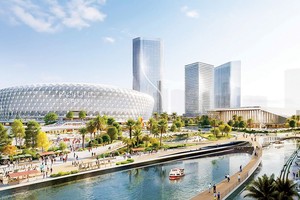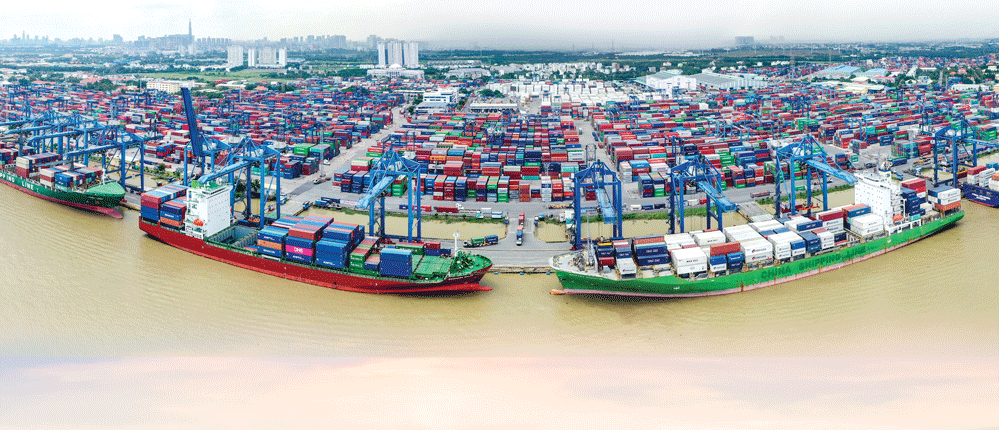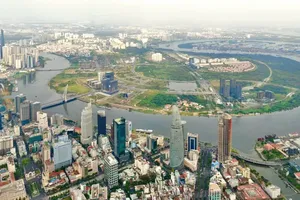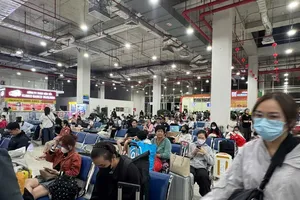
The project to build 1 million social housing apartments is being urgently implemented, however, according to experts, this number is still very small compared to people’s actual housing needs in urban areas. The only way is to increase the supply of housing with reasonable prices for low-income people.
According to information from the Ministry of Construction, the urbanization rate in our country is currently around 40 percent (the rest is the rural population) and will increase to 45 percent by 2030. Thus, each year urban areas must increase about 70 million square meters of housing mostly in some major cities and industrial zones. In Hanoi alone, according to the housing development plan for the period 2022-2025, the total housing demand is around 185,200 including 166,600 apartments.
However, research data from some survey units shows that the number of newly opened apartments for sale is continuously decreasing. From now to 2025, on average each year, Hanoi is forecast to be short of about 50,000 apartments.
Meanwhile, in the housing development program for the period 2021-2030 in Ho Chi Minh City, the city is striving for 50 million square meters of additional floor area of housing between 2021 and 2025, according to the Ho Chi Minh City Department of Construction. However, up to now, the new target has only reached over 40 percent. The average housing area per person in Ho Chi Minh City as of April 2024 is only 21.85 square meters per person, while the national common goal is to reach about 27 square meters per person by 2025 and 30 square meters per person by 2030.
Meanwhile, the development of the real estate market is increasingly showing many shortcomings, as the segment of affordable housing with under VND25 million per square meter in large cities is no more whereas housing with the price at around VND30 million per square meter is also very rare.
At this time, with a budget of under VND2 billion, buyers find it almost impossible to find apartments near the city center. Real estate trading floors show that the average selling price of apartments in Hanoi in the second quarter of 2024 is VND46 million per square meter while in Ho Chi Minh City it is about VND48 million per square meter.
Assessing the current housing prices, Associate Professor Dang Hung Vo, former Deputy Minister of Natural Resources and Environment, said that the increase in apartment prices despite the market downturn is not surprising, because the actual housing demand is very high, while the middle and high-end segments still account for the majority of the products offered by real estate businesses.
Chairman Vu Tien Loc of the Vietnam International Arbitration Center, a member of the National Assembly's Economic Committee, also said that with the current traditional approach, most high-priced houses are available in the realty market whereas there are a few social housing and affordable housing which will lead to a deadlock. Administrative measures are likely not to solve the fundamental problems of the market. According to him, increasing the supply of affordable housing for low-income people is the only approach that can solve the root cause of the problem.
Development strategy for the construction industry to 2030, with a vision to 2045:
• Policies to encourage the development of commercial housing projects with an average area and prices suitable for the affordability of different groups according to market mechanisms should be developed.
• Related departments and agencies should study and propose housing support programs for poor households in rural areas according to the new poverty standards as well as carry out a program to support poor households in building flood and storm resilient housing, and other housing support programs.
Professor Hoang Van Cuong, a member of the National Assembly's Finance and Budget Committee, said that if the government intentionally presses down the prices of housing without carefulness, it will lead to deviation. Therefore, responsible agencies and experts need to monitor factors influencing the rise of house prices including intermediary costs, informal costs, and opportunity costs. These costs can be controlled by responsible agencies.
In the context of rapidly rising real estate prices, Le Xuan Nghia, a member of the National Monetary and Fiscal Policy Advisory Council, proposes analyzing the shortcomings of the current social housing policy. He suggests considering whether social housing can be integrated into the affordable housing segment as a subset. This would simplify policymaking and management.
While initiating and developing an affordable housing market in Vietnam is feasible, economists argue that the current real estate market lacks adequate government attention and policies. Prof. Dang Hung Vo points to several factors contributing to this situation, including incomplete policies and laws, complex and lengthy administrative procedures and rising input costs (e.g., bank loan interest, materials, equipment, and labor. These challenges discourage investors from pursuing affordable housing projects.
To address the pressing need for housing in major cities, experts propose accelerating the construction of one million social apartments while developing affordable commercial housing. However, the development of affordable commercial housing is dependent on various factors such as land prices. Land prices vary significantly across localities. For instance, Hanoi and Ho Chi Minh City have high land costs making it difficult to develop affordable housing without land price incentives.
Thus, he said the government and related agencies should have synchronous solutions to encourage investors to pour money into low-priced commercial houses to benefit urban buyers with meager income.
Deputy Director Nguyen Manh Khoi of the Department of Housing and Real Estate Market Management disclosed that the Ministry of Construction is studying solutions to promote affordable commercial housing development. The Ministry proposed that local authorities should establish clear targets for affordable commercial housing development.
Moreover, the Ministry of Construction is developing design standards and price caps for affordable commercial housing. As per the Ministry’s set price caps, the price of houses will not exceed VND25 million per square meter for houses in big cities and VND20 million per square meter for houses in the remaining cities and provinces.
The sales price includes VAT but does not include the maintenance fund for common areas in addition to land incentives.
Developers of affordable commercial housing projects are entitled to defer land use fee payments within the prescribed timeframe from the date of land allocation, land lease, or land use conversion permission granted by the government, as per land and investment laws.
Furthermore, developers of affordable commercial housing projects are exempted from the design implementation stage review process following the basic design stage. They will also be provided with free access to design templates and typical designs for affordable commercial housing issued by the competent authorities for reference.
Overall, these incentives aim to encourage and facilitate the development of affordable commercial housing projects to meet the growing housing demand in Vietnam.
























